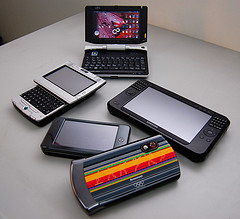What's In A Name? Acronyms & Abbreviations Under Fire
A comment on our new "He Said, She Said" feature discussing the likelihood of either an Apple Mac Tablet or a Mac UMPC took us to task for our reliance on acronyms and abbreviations. It started me thinking about how naming conventions start, what degree of understanding by others we take for granted, and how we might be in fact promoting misunderstanding by attempting to streamline how we discuss technology.
"What is a UMPC? Please let's stop using abbreviations all the time, we should be able to speak and write words, properly spelled and not to be primitive and use only one letter from each word which is properly describing an object. Communication is not a quiz, but it is a skill!" Gyula Bognar
When we first read Gyula's comment, Brenda and I joked that if we used the full version of every acronym in every article we ever write, they'd all be three times as long. With the exception, perhaps, of medical science, the consumer electronics industry is likely the biggest abbreviation addict around. In computing alone we have the basic PC (Personal Computer), the UMPC (Ultra Mobile Personal Computer), MID (Mobile Internet Device), ULCPC (Ultra Low Cost Personal Computer) and UMD (Ultra Mobile Device), among others. That's before you get inside and start to deal with PCI (Peripheral Component Interconnect), SATA (Serial Advanced Technology Attachment) and USB (Universal Serial Bus).
As the length of those last two sentences attests, ease of reading is a possible benefit from acronyms. That, though, raises another point that sometimes us geeks forget: most 'normal' people don't have a clue what the full names, never mind the acronyms, mean.
"UMPC? Ultra Mobile Personal Computer? Smart! The objects described are not mobile, they don't move on their own, they have to be carried. Therefore they could be called Ultra Portable Personal Computers. UPPC, for abbreviation lovers. Then why bother with the word "Ultra" if something is portable it it, ultra or not, what is the difference?" Gyula Bognar

Since "UMPC" is topical, lets concentrate on that for a moment. Those who have been following the tech world for a while might know that the term was coined by Microsoft to describe a smaller type of touchscreen Tablet PC. "Ultra Mobile", then, was intended to differentiate between a full-size mobile device such as a laptop and a larger handheld such as a UMPC. Problem is, Microsoft wanted UMPC to solely describe a product of its own envisioning: Windows OS, 7-inch passive touchscreen and its Origami software additions to make the whole thing finger-friendly. So when Intel decided it wanted a piece of the handheld pie, it couldn't use Microsoft's definition and had to create its own: enter MID, which the company decided was more about internet surfing and media playback than office apps.
It was confusing enough for those of us who worked with tech like this every day, never mind an audience who just want to go online while they're waiting in the Post Office queue. Half of the reason behind these acronyms is a manufacturer grabbing the opportunity to define the niche (and then say "look, we fill it best!"), and I'm tempted to believe that the other half is in the hope that consumers will adopt the name so wholeheartedly that it will define all such devices, no matter the manufacturer. Look to the iPod (ironically not an acronym itself) for the idea of one product's name coming to define a whole segment.
As for myself, I'm going to try to remember the freshly-geeky among us and hopefully either link to, or simply explain, what some of the more esoteric abbreviations stand for (and actually mean!) I think it's also a pretty good idea to challenge some of the definitions manufacturers merrily invent, and not allow them to create their own segment and then announce "it's the first of its kind!"
I'm curious as to what you think about acronyms: useful time-saver or scourge of language? Let me know in the comments.
Image credit: Josh Bancroft
